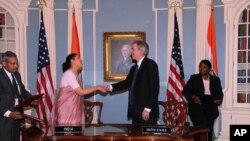On July 30, U.S. Under Secretary of State for Political Affairs Bill Burns and Indian Ambassador to the United States Meera Shankar signed the Arrangements and Procedures of the Agreement for Cooperation Concerning Peaceful Uses of Nuclear Energy.
This step permits India to re-process U.S.-origin spent nuclear fuel in accordance with the historic U.S./India Agreement for Peaceful Nuclear Cooperation in its own reprocessing plants and use the derived nuclear material for civilian activities. The process and all material will be under International Atomic Energy Agency safeguards.
This arrangement, negotiated under President Obama, reflects this Administration’s strong commitment to building successfully on the landmark U.S.-India Civil Nuclear Cooperation Initiative, a bilateral accord on civil nuclear cooperation initiated in 2005, and opens the door for U.S. nuclear fuel suppliers to conduct business with India.
This is a big step for India. Growth demands energy, but India, with its booming economy that is projected to grow at around 8 percent a year for the next 2 decades, suffers from chronic energy shortages. If it intends to maintain its rapid economic expansion, India must drastically increase its energy output. Yet it has only a very limited supply of oil, coal and natural gas.
Thus, the Indian government views an expansion of its civilian nuclear energy program as a way to meet some of India's energy woes. For more than 3 decades, this possibility was out of reach, but in 2008, under the leadership of the United States, India was granted an exception by the Nuclear Suppliers Group to enable civil nuclear cooperation with India.
The signing of the reprocessing Arrangements and Procedures marks 1 of the final steps in the implementation of the U.S.-India Civil Nuclear Cooperation Initiative, demonstrating yet another indication of the close relationship between the United States and India.




